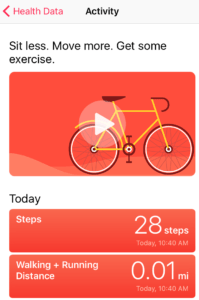“Four Reasons NOT to Read This Article” sounds like a title meant to provoke your interest.
It is.1
But aside from that, not reading another article online is probably good advice.
Let me explain.
One recent weekend morning, I spent five hours consuming articles and video clips online. Like many idle cyber flaneurs, I glutted myself with an uneven mix of brain vegetables and mindless junk food. Longer think pieces on politics, shorter news articles, a few SNL skits to lighten the tone, snippets from bumbled press conferences…whatever shiny things crackled and popped on Youtube, the New York Times, Twitter, and the Atlantic.
As I sat in pajamas, watching the sun climb then disappear over my house, I found myself growing…numb. I was not enjoying this lounge-fest, but I couldn’t summon the energy to pull out of my Internet Sloth Spiral either. My phone, with its brand new battery, was flagging – it had quickly gone from 100% to Power Save Mode — and it let me know of this depressing fact. My soul was hovering around 20%, as well.
“Good grief…look at your life!” I thought — and forced myself outside for an afternoon run.
* * *
I submit, for your consideration, some facts about our collective internet consumption:
- 2.9 billion Google searches are made every day.
- There are 966 million unique websites in existence.
- 37,000 of those sites are hacked daily.
- 2.7 million blog entries – like this one – are posted every day.
- WordPress alone hosts 76.5 million blogs, including The Jesuit Post.
- 75.1% of online Americans access the internet and social media through mobile devices. The internet is with us wherever we go.
- 56% of internet traffic comes from robots and spammers; only 44 percent comes from humans.
And perhaps most alarming for me: a 2016 Nielsen Company audience report found that adults in the United States now spend an average of 10 hours and 39 minutes in front of their screen(s) each day. This included tablets, smartphones, home computers, multimedia devices, work laptops, video games, radios, DVDs, TVs, DVRs…

Just let that number sink in a for a hot minute. 10 hours, 39 minutes, every day.
Yikes.
“Not me!” you protest, rather quickly. Well, me neither, I say. I would never spend that much time in front of a screen! Me, a lover of books, poetry, art, and face time with interesting people. Me, a physically active adult. -ish. Me, a man studying for the priesthood, who — per St. Ignatius’ over-laundered wisdom — aspire to a “discerned use of all created things…”
And yet, there I sat: frittering away five consecutive hours on a pleasant morning, just because I had no commitment pressing me to engage the non-pajamaed world outside.
* * *
10 hours, 39 minutes? Phhh…not me. Could it be? I submit four moments2 when screen time sneaks up on us each day. It begins when I…
1. Wake Up! Let’s review a typical start to my day:
- Wake up to a smartphone alarm, which opens unto the Magical World of Internet.™
- Check for new texts, the day’s weather, refresh emails.
- Skim news pushed to the phone from around the world.
- Grow wistful, re-watching videos of my diapered nephew toddling and speaking adorably…
I’ve already sacrificed 30-45 minutes to this glassy demigod, before I’ve even gotten out of bed.
Yes, but what about when you’re out of bed early and working? Certainly that means less time spent in front of a screen! We turn then to…
2. Daylight Screenings Time. Even on days when I have graduate classes and reading, most of it is planted in front of my laptop:
- A few hours of distracted PDF reading and Canvas posts for class; followed by
- Three hours of classroom screen time; plus
- Two-to-three hours spent emailing throughout the day…flitting between this or that site…iMessaging friends and family…writing a homily, or a blog post, or dragging my feet to pen a short essay.
This Blended Screen Time — heck, let’s call it “BS Time” — offers neither focused productivity, nor restorative leisure. Rather, BS Time leaves us feeling distracted, unproductive, and pulled in different directions. Which is compounded by…
3. Me, Myself and iPhone. None of this screen time takes account of the dozens of unconscious phone checks throughout the day (yes, dozens). Who hasn’t felt the endorphin rush from an incoming text message? Who doesn’t “refresh” their inbox every half hour, like a slot machine junkie hoping for a big haul? We wait with muted panic for some email – any email – to come in, marked bold! Bold with newness!
And when there are no new texts or emails (criminy, not even work emails?) — we wonder, just for a moment, if anyone remembers we exist.
Isn’t all this technology supposed to make us feel more connected? Why do we feel, to borrow a term from MIT professor Sherry Turkle, alone together? Oh well. Let’s check Facebook and Instagram to see if we can get an emotional contact-high from someone else’s well-curated life. What’s this? Up-to-the-minute political soapboxing? Someone skiing in Denver with kittens? An ad for Dollar Shave Club? Sigh.
Why do I do this to myself, again?
4. Nighttime and Netflix. After a long day of distracted, semi-productive BS Time, it’s nice to have a measurable physical task before bed, like folding the laundry, or cleaning the bedroom. But gosh…it sure is…quiet. Why don’t I turn on an old 30 Rock, or see if a new episode of Young Pope or Veep is online yet? An hour or two later, the amped up rods and cones of my retinas finally get to unplug from the iPad. But that odd blue light, which has oversaturated the retinas, keeps the mind spinning in a hoary afterglow.
And the addled brain wonders,
Is it possible that I just spent 10 hours in front of screens today?
And if I didn’t, doesn’t an average of 10+ hours mean that a lot of other Americans spend more than 10+ hours every day in front of screens?
* * *
You might scoff at all this, or shake your head in pitying silence, or turn away in knowing horror. But…I’d venture to say that these Pavlovian pings and sad trifles texture the daily life of many American young adults. But is this really life? Am I just being an ornery Troglodyte, the likes of whom I challenged just last year here?
I don’t know for sure, but I find it telling that Steve Jobs strictly limited his kids’ screen time. Telling…not surprising. I doubt McDonald’s execs encourage their kids to eat a lot of fast food, either.
I could expend a lot more time here suggestion habits for us to get off the internet, and go outside. To not start our day with a smartphone. To ditch Facebook. I could probably write an irresistibly clickable “5 Ways to Enjoy Your Life More…[Alec Baldwin could NOT believe #3!].”
But, the internet can not solve your problems for you, which might be the best reason not to read this article. I submit that the source of our collective problem is that we have been conditioned to turn to the crowd-sourced wisdom of the internet to tell us how to live our lives away from the internet. There is a cruel irony here: like McDonald’s ads that remind us to be active between fattening bites, our smartphones deliver addictive content with one hand, and pesky reminders to “Sit Less. Move More. Get some exercise!” with the other. Like a capricious parent or a manipulative spouse, the internet giveth — and the internet taketh away. The internet, and the snake oil vendors who capitalize on its seductive sway, have little reason for you and me to unplug.

Such a nasty iPhone…
* * *
I trust you see where I’m going here. What would spending a full day — how about this Saturday? — totally unplugged be like? What desires mighty re-emerge through the dissipating mental fog? I submit that you and I already know what we really want to do, if we didn’t have Apple-sponsored Stockholm Syndrome ten hours a day.
So…
What will you do? Discuss ideas over coffee with a friend? Pen a note to your sister? Take a long stroll with a neighbor? Purge your basement or attic? Perhaps — gasp — spend an afternoon enjoying the pleasure of your own company?
“All of humanity’s problems,” Blaise Pascal writes, “stem from our inability to sit quietly alone in a room.” If he’s right, then the problem is not seductive screens, or the internet’s siren song; those are just modern-day symptoms of humanity’s eternal issue: a deep-seated fear of solitude.
And that, dear reader, is some good food for thought.
–//–
Tomorrow, your friend and mine Michael Rossmann, SJ offers a counterpoint to my assessment of screen time.
Title image by Flickr user afromztoa is available online here.
Image of Apple products by Flickr user Jesús G. Flores is available online here.


